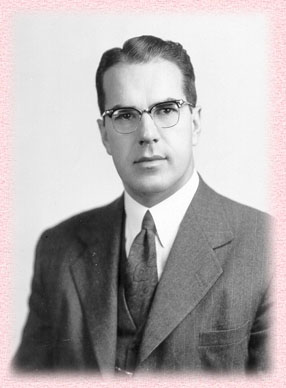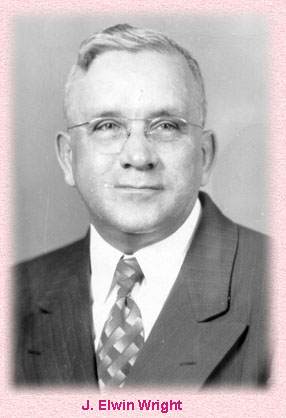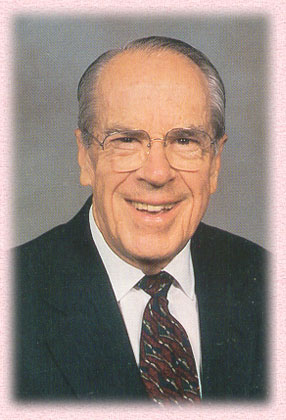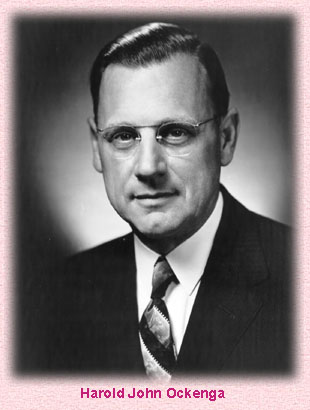
Excerpt (approximately 14 minutes) from the oral history with John Huffman, who
was interviewed by Robert Shuster in 1988. This excerpt come from audio tape T3 in Collection 389. To find out more about Huffman
click here.

INTERVIEWER: How were you originally involved in that movement [National Association of
Evangelicals]?

HUFFMAN: I was involved in that movement very much
like I was in the other movements we've described: as sort of a footman for Dr. Ockenga. And
as in every development there's always the inspirer of...of a movement and then there's the...the
dynamic leader who gives some kind of credence to that, and then there are always the footmen
that do the behind-the-scenes work. So by the time the thought of a National Association of
Evangelicals began, I had already finished my time with Dr. Ockenga at Park Street Church, the
late 30s, and I was on the board of the New England Fellowship, and Ockenga was on practically
every board that I was on during that period of time: New England Fellowship, the Child
Evangelism [Fellowship], and you name it. And there was just a growing feeling that the
Evangelicals were becoming strong enough that there should be a national voice of some kind.
INTERVIEWER: Growing feeling among whom?
HUFFMAN: Among the leaders of Evangelicals across the country, I would say, but particularly
in New England. J. Elwin Wright had already been for a  decade or two very much engaged
in...in the New England Fellowship work. And the New England Fellowship was a loosely
organized organization that had been built around one major theological fact, and that was that
there were Evangelical truths that were very precious. And in New England which was...had
been for some years pretty much Unitarian, very very weak so far as the...even the large
org...denominations were concerned. Presbyterianism was almost unknown in New England,
certainly didn't carry any...any great weight. Congregationalism was the major Protestant group.
Baptists fairly strong, but Congregationalism was the strongest theo...Protestant group in the
Boston area through New England. And by 1940 Congregationalism was pretty watered down
till it was more Unitarian than...than Trinitarian in certain places, and certainly very few places
Evangelical with the one major exception of Park Street Church, which was a citadel of
Evangelicalism. And Park Street Church was just under the shadow of the Congregational
House, which was the head of the entire Congregational system of the country. But Park Street
Church was...was bigger and...and had a greater voice and impact on New England than the
Congregational House itself. J. Elwin Wright was the inspirer, I would say, of the concept
of...Na...of NAE, National Association of Evangelicals. He didn't have the equipment, he didn't
have the leadership ability, nor the vision of creating a national organization. But he had
demonstrated under the watchful eye of Dr. Ockenga, who had all of those abilities, that you
could bring a very dynamic movement into being by broadening your theological base so you
would include Calvinists and Arminians, all of a Evangelical persuasion under one umbrella, so
to speak. So the New England Fellowship....
decade or two very much engaged
in...in the New England Fellowship work. And the New England Fellowship was a loosely
organized organization that had been built around one major theological fact, and that was that
there were Evangelical truths that were very precious. And in New England which was...had
been for some years pretty much Unitarian, very very weak so far as the...even the large
org...denominations were concerned. Presbyterianism was almost unknown in New England,
certainly didn't carry any...any great weight. Congregationalism was the major Protestant group.
Baptists fairly strong, but Congregationalism was the strongest theo...Protestant group in the
Boston area through New England. And by 1940 Congregationalism was pretty watered down
till it was more Unitarian than...than Trinitarian in certain places, and certainly very few places
Evangelical with the one major exception of Park Street Church, which was a citadel of
Evangelicalism. And Park Street Church was just under the shadow of the Congregational
House, which was the head of the entire Congregational system of the country. But Park Street
Church was...was bigger and...and had a greater voice and impact on New England than the
Congregational House itself. J. Elwin Wright was the inspirer, I would say, of the concept
of...Na...of NAE, National Association of Evangelicals. He didn't have the equipment, he didn't
have the leadership ability, nor the vision of creating a national organization. But he had
demonstrated under the watchful eye of Dr. Ockenga, who had all of those abilities, that you
could bring a very dynamic movement into being by broadening your theological base so you
would include Calvinists and Arminians, all of a Evangelical persuasion under one umbrella, so
to speak. So the New England Fellowship....
INTERVIEWER: Well, you say that...that he was the inspirer but he didn't really have the vision.
What do you mean by that?
HUFFMAN: By that I mean that he demonstrated, in New England, the fact that you could get
Congregationalists and Baptists, and then it...it would (the word charismatics was not the
word)...but it would...would be the Pentecostals and even the...the [pauses] some of the...less
acceptable Eva...Evangelicals together.
INTERVIEWER: Such as who?
HUFFMAN: And I'll bring that out as I go along here in a little bit. But those who believed in
the five fundamentals of the faith, let's put it that way, but had a lot of differences on the non-essentials.
[portion of interview omitted]
INTERVIEWER: And how were you involved in these early days of the beginning of the movement?
HUFFMAN: Well, I was by this time pastor of the Cornerstone Church of Cambridge across the
river from Boston. I was, of course, an understudy of Ockenga, very closely related with him. At
 that time...by that time we were doing together, and I was on the E...on the...as I had mentioned
before, on the board of the New England Fellowship. So I guess, to answer that question more
intelligently, I was actively engaged in the organization which the...was the forerunner of NAE,
and that was New England Fellowship, of which J. Elwin Wright was the founder and the active
head. Ockenga was the frontman. He was the...the person that we'd all go to when we wanted to
really get some backing for a project that would get attention in New England, and he was active
in the New England Fellowship as was I. I was on the air daily on my own program, Wings of the
Morning, which grew from one station to some twelve stations in New England, closely working
with Howard Ferrin and Howard Boo...Howard Ferrin and Carlton Booth, who had The
Mountaintop Hour. And New England Fellowship had its own program. I was a...an occasional
speaker on that also. So we were all doing our own thing, but were cooperating in bringing in
outstanding Bible teachers through the New England Fellowship to minister throughout the
whole New England area, putting on rallies, sponsoring certain outstanding outside-of-New
England leaders such as Jack Wyrtzen, Percy Crawford, Howar...later on Charles Fuller, and so
forth, in sporadic big meetings. But it got to the place where Dr. Ockenga and J. Elwin Wright,
Howar...Gordon Brownville were at the Tremont Temple, and Howard Ferrin then of Providence,
and some of the rest of us became convinced that we really needed a united voice in New
England, which would certainly equal, if not surpass, the voice of the Federal Council of
Churches. And Dr. Ockenga became convinced that the New England Fellowship had set the
pattern for that in its type of organization and its ability to appeal under the banner of "In
essentials...." [pauses] Let's see, what is the banner of NAE?
that time...by that time we were doing together, and I was on the E...on the...as I had mentioned
before, on the board of the New England Fellowship. So I guess, to answer that question more
intelligently, I was actively engaged in the organization which the...was the forerunner of NAE,
and that was New England Fellowship, of which J. Elwin Wright was the founder and the active
head. Ockenga was the frontman. He was the...the person that we'd all go to when we wanted to
really get some backing for a project that would get attention in New England, and he was active
in the New England Fellowship as was I. I was on the air daily on my own program, Wings of the
Morning, which grew from one station to some twelve stations in New England, closely working
with Howard Ferrin and Howard Boo...Howard Ferrin and Carlton Booth, who had The
Mountaintop Hour. And New England Fellowship had its own program. I was a...an occasional
speaker on that also. So we were all doing our own thing, but were cooperating in bringing in
outstanding Bible teachers through the New England Fellowship to minister throughout the
whole New England area, putting on rallies, sponsoring certain outstanding outside-of-New
England leaders such as Jack Wyrtzen, Percy Crawford, Howar...later on Charles Fuller, and so
forth, in sporadic big meetings. But it got to the place where Dr. Ockenga and J. Elwin Wright,
Howar...Gordon Brownville were at the Tremont Temple, and Howard Ferrin then of Providence,
and some of the rest of us became convinced that we really needed a united voice in New
England, which would certainly equal, if not surpass, the voice of the Federal Council of
Churches. And Dr. Ockenga became convinced that the New England Fellowship had set the
pattern for that in its type of organization and its ability to appeal under the banner of "In
essentials...." [pauses] Let's see, what is the banner of NAE?
INTERVIEWER: "In essentials, unity..."
HUFFMAN: And....
INTERVIEWER: "...nonessentials, freedom."
HUFFMAN: Something like that. That's...that's the gist of it, yes.
[intervening discussion; tape advanced]
HUFFMAN: But behind...the driving power behind this so far as New England was concerned
was Ockenga. Do you remember the city? It was....

INTERVIEWER: It was Columbus.
HUFFMAN: It was Columbus. I was there. I just forgot which of the cities. Now, at this same
time, while this was happening in New England, in other parts of the country there were other
leaders that had the same kind of a vision. And Carl McIntire was the number one, other than
Ockenga, who had this vision. McIntire was a very different type of man than Ockenga, but they
were buddies in seminary up to a point. They were so close they were in each others weddings as
best men, and they were very, very closely tied together in their very, very early days, in their
seminary days. Ockenga was in Princeton, and I assume that McIntire was in Princeton. I'm not
too sure of that. I think he must have been for a while. Then the Princeton split came where
Ockenga went to Westminster and about that point he and McIntire became separated in their
close friendship.
INTERVIEWER: Because?
HUFFMAN: Geographically and in general philosophy of how to handle people and...not so
much theologically but in implementing their work.
INTERVIEWER: What was the...how so? How did they...?
HUFFMAN: McIntire was a...a separatist. Ockenga had a wider view. Ockenga was
democratic. McIntire was autocratic. And they both agreed to appear at the [NAE organizing]
meeting in 1942, I think it was in Cincinnati.
[intervening discussion; tape advanced]
HUFFMAN: They both agreed to come. Now McIntire came to that meeting with an
organization of his own already set up partially. It hadn't become nationwide yet, but it was a
vision he had and it was rapidly becoming that. And Ockenga came, of course, with the thrust
of...of the New England Fellowship and the experiment in the New England Fellowship which
gave him what he felt was the pattern that could be blown up into a nationwide organization.
[intervening discussion; tape advanced]
HUFFMAN: ...And McIntire was there with his..his split-off of Presbyterian group. What did he
call his group?
INTERVIEWER: The American...
HUFFMAN: American Council...
INTERVIEWER: ...Council of Christian Churches.
INTERVIEWER: ...of Christian Churches.
HUFFMAN: So the showdown came on the floor when they came to elect a president of the
organization. And Ockenga was put up as a nominee and McIntire was put up as a nominee, by
their respective followers, of course. And the question came. Here were two that started out
together, were buddies together, and now they are rivals on the national scene. Behind the scenes
there had been a lot of...of things developing which indicated they were pulling farther and farther
apart. Ockenga being more of a churchman, a far broader view of, not theology, but of
fellowship, who he would accept and who wouldn't accept, and McIntire saying, "Here it is.
This...it's....this is my package. [train whistles in background] God called me to bring this...this
organization into existence." [train whistles in background] And when on the open floor the
question came and was put to each of these two leaders, "Will you accept the vote of this group
as authority as to who is to be the leader of this newly organizing movement?" Ockenga said, "I
will accept the democratic procedure of electing a president. And if McIntire is elected
president, I'll serve loyally in the movement to help build it." That sounded good. McIntire was
called upon. I'll never forget his moving up into the platform with his briefcase under his arm
and his hair standing on end practically, and he's saying, "No, God called me to lead this
movement, and I'll leave...lead or leave it." And of course Ock...
INTERVIEWER: When you said "this movement," he meant?
HUFFMAN: This new thing that's being born here. And he...now they're electing a president.
Now it was to be called National Association of Chr...National Association of Evangelicals. And
it was organized now. And we that were there, (there were hundreds of us there), we...we chose
the name. Now we're choosing the president. So Ockenga went in overwhelmingly as the
president.
To find out more about John Huffman or Collection 389 at the Archives
click here.
Last Revised: 11/13/02
Expiration: indefinite
 decade or two very much engaged
in...in the New England Fellowship work. And the New England Fellowship was a loosely
organized organization that had been built around one major theological fact, and that was that
there were Evangelical truths that were very precious. And in New England which was...had
been for some years pretty much Unitarian, very very weak so far as the...even the large
org...denominations were concerned. Presbyterianism was almost unknown in New England,
certainly didn't carry any...any great weight. Congregationalism was the major Protestant group.
Baptists fairly strong, but Congregationalism was the strongest theo...Protestant group in the
Boston area through New England. And by 1940 Congregationalism was pretty watered down
till it was more Unitarian than...than Trinitarian in certain places, and certainly very few places
Evangelical with the one major exception of Park Street Church, which was a citadel of
Evangelicalism. And Park Street Church was just under the shadow of the Congregational
House, which was the head of the entire Congregational system of the country. But Park Street
Church was...was bigger and...and had a greater voice and impact on New England than the
Congregational House itself. J. Elwin Wright was the inspirer, I would say, of the concept
of...Na...of NAE, National Association of Evangelicals. He didn't have the equipment, he didn't
have the leadership ability, nor the vision of creating a national organization. But he had
demonstrated under the watchful eye of Dr. Ockenga, who had all of those abilities, that you
could bring a very dynamic movement into being by broadening your theological base so you
would include Calvinists and Arminians, all of a Evangelical persuasion under one umbrella, so
to speak. So the New England Fellowship....
decade or two very much engaged
in...in the New England Fellowship work. And the New England Fellowship was a loosely
organized organization that had been built around one major theological fact, and that was that
there were Evangelical truths that were very precious. And in New England which was...had
been for some years pretty much Unitarian, very very weak so far as the...even the large
org...denominations were concerned. Presbyterianism was almost unknown in New England,
certainly didn't carry any...any great weight. Congregationalism was the major Protestant group.
Baptists fairly strong, but Congregationalism was the strongest theo...Protestant group in the
Boston area through New England. And by 1940 Congregationalism was pretty watered down
till it was more Unitarian than...than Trinitarian in certain places, and certainly very few places
Evangelical with the one major exception of Park Street Church, which was a citadel of
Evangelicalism. And Park Street Church was just under the shadow of the Congregational
House, which was the head of the entire Congregational system of the country. But Park Street
Church was...was bigger and...and had a greater voice and impact on New England than the
Congregational House itself. J. Elwin Wright was the inspirer, I would say, of the concept
of...Na...of NAE, National Association of Evangelicals. He didn't have the equipment, he didn't
have the leadership ability, nor the vision of creating a national organization. But he had
demonstrated under the watchful eye of Dr. Ockenga, who had all of those abilities, that you
could bring a very dynamic movement into being by broadening your theological base so you
would include Calvinists and Arminians, all of a Evangelical persuasion under one umbrella, so
to speak. So the New England Fellowship....

 that time...by that time we were doing together, and I was on the E...on the...as I had mentioned
before, on the board of the New England Fellowship. So I guess, to answer that question more
intelligently, I was actively engaged in the organization which the...was the forerunner of NAE,
and that was New England Fellowship, of which J. Elwin Wright was the founder and the active
head. Ockenga was the frontman. He was the...the person that we'd all go to when we wanted to
really get some backing for a project that would get attention in New England, and he was active
in the New England Fellowship as was I. I was on the air daily on my own program, Wings of the
Morning, which grew from one station to some twelve stations in New England, closely working
with Howard Ferrin and Howard Boo...Howard Ferrin and Carlton Booth, who had The
Mountaintop Hour. And New England Fellowship had its own program. I was a...an occasional
speaker on that also. So we were all doing our own thing, but were cooperating in bringing in
outstanding Bible teachers through the New England Fellowship to minister throughout the
whole New England area, putting on rallies, sponsoring certain outstanding outside-of-New
England leaders such as Jack Wyrtzen, Percy Crawford, Howar...later on Charles Fuller, and so
forth, in sporadic big meetings. But it got to the place where Dr. Ockenga and J. Elwin Wright,
Howar...Gordon Brownville were at the Tremont Temple, and Howard Ferrin then of Providence,
and some of the rest of us became convinced that we really needed a united voice in New
England, which would certainly equal, if not surpass, the voice of the Federal Council of
Churches. And Dr. Ockenga became convinced that the New England Fellowship had set the
pattern for that in its type of organization and its ability to appeal under the banner of "In
essentials...." [pauses] Let's see, what is the banner of NAE?
that time...by that time we were doing together, and I was on the E...on the...as I had mentioned
before, on the board of the New England Fellowship. So I guess, to answer that question more
intelligently, I was actively engaged in the organization which the...was the forerunner of NAE,
and that was New England Fellowship, of which J. Elwin Wright was the founder and the active
head. Ockenga was the frontman. He was the...the person that we'd all go to when we wanted to
really get some backing for a project that would get attention in New England, and he was active
in the New England Fellowship as was I. I was on the air daily on my own program, Wings of the
Morning, which grew from one station to some twelve stations in New England, closely working
with Howard Ferrin and Howard Boo...Howard Ferrin and Carlton Booth, who had The
Mountaintop Hour. And New England Fellowship had its own program. I was a...an occasional
speaker on that also. So we were all doing our own thing, but were cooperating in bringing in
outstanding Bible teachers through the New England Fellowship to minister throughout the
whole New England area, putting on rallies, sponsoring certain outstanding outside-of-New
England leaders such as Jack Wyrtzen, Percy Crawford, Howar...later on Charles Fuller, and so
forth, in sporadic big meetings. But it got to the place where Dr. Ockenga and J. Elwin Wright,
Howar...Gordon Brownville were at the Tremont Temple, and Howard Ferrin then of Providence,
and some of the rest of us became convinced that we really needed a united voice in New
England, which would certainly equal, if not surpass, the voice of the Federal Council of
Churches. And Dr. Ockenga became convinced that the New England Fellowship had set the
pattern for that in its type of organization and its ability to appeal under the banner of "In
essentials...." [pauses] Let's see, what is the banner of NAE?